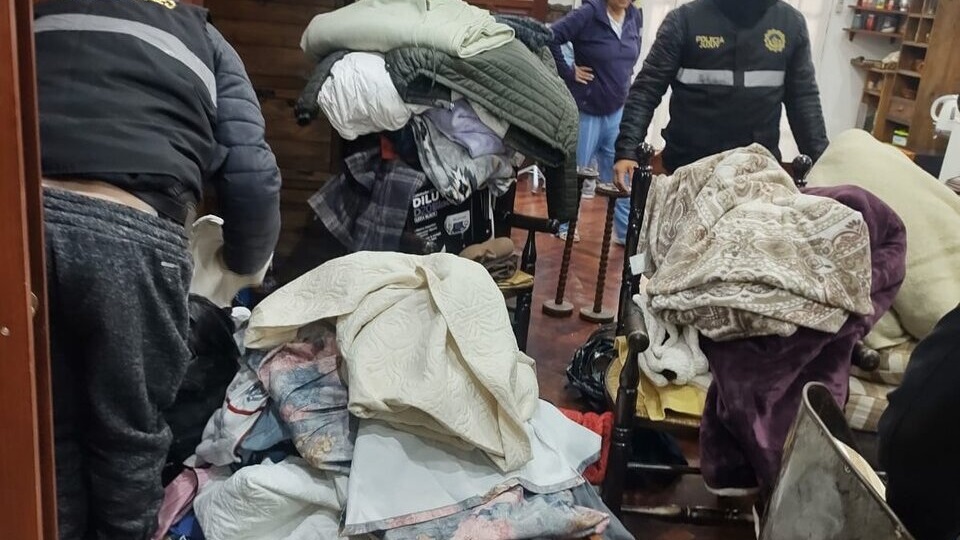The police in the Jujuy province of Argentina, on Thursday, June 29, raided the home of Indigenous and social leader Milagro Sala, who has been imprisoned since January 2016. Human rights and social activists allege that the charges that led to the raid are politically motivated.
The warrant to search the property of Sala, the leader of the Tupac Amaru Neighborhood Organization, was issued by Federal Judge Rodolfo Fernández. It was issued as part of an investigation into alleged public disturbances in recent days during the protests rejecting the reforms to the provincial Constitution. The reforms, promoted by conservative Governor Gerardo Morales of the right-wing Radical Civic Union party, have been widely opposed in the province. The warrant was requested by Prosecutor Diego Funes after a defendant, whose identity has been kept confidential, alleged that Sala had played a role in instigating the events.
In recent days, the Morales government has accused Sala of being linked to the mobilizations that began on June 5. This is despite the fact that she is under house arrest and has no way of communicating with anyone outside without the authorities’ prior knowledge.
Alejandro Coco Garfagnini, a leader of the Tupac Amaru, told Página/12 that the officers seized money, personal computers, and mobile phones, among other valuables, and turned the whole house upside down. Garfagnini also reported that the police personnel carried out the raid violently, even in the room where Sala’s terminally ill husband, journalist Raúl Noro was resting after returning from a hospital two days ago.
Garfagnini said that while the raid was in progress, Noro suffered a serious breakdown. He said that Milagro called an ambulance and the doctors were allowed to enter the home to attend to Noro, but were prevented from leaving by the police. Garfagnini said that it was only after the doctors insisted that Noro was taken to a clinic. He condemned the delay in providing medical attention to Noro as “a new act of harassment” towards Sala.
Seven and a half years ago, Sala was arrested over similar charges of inciting violence and chaos in Jujuy. She was accused of sedition for organizing and leading a month-long protest against the regressive changes made to the housing cooperative system by the then newly-elected governor Morales. Following her arrest, the Morales administration unleashed a campaign of persecution against her, involving different criminal charges without evidence, and aimed at ensuring her indefinite detention and pre-trial imprisonment. She faced charges in a total of 12 cases. Some cases were dismissed, but others are still ongoing or have resulted in her conviction. National and international human rights organizations have repeatedly denounced the irregularities in the legal process against Sala. In December 2018, she was placed under house arrest due to serious health issues.
Read more: Argentine political leaders demand immediate release of Indigenous activist Milagro Sala
On Wednesday, June 28, human rights organizations in Jujuy warned that the Morales government had been planning to transfer Sala back to jail, after she was taken for a medical evaluation outside her home “without a judicial order.”
Elizabeth Gómez Alcorta, former Minister of Women, Genders and Diversity and a part of Sala’s legal team, tweeted that “Gerardo Morales, in the middle of the electoral campaign, intends to hold Milagro Sala responsible for the anger and courage of the people of Jujuy. They are raiding her house in the framework of the cases investigating the alleged crimes for the demonstrations. They are a dictatorship.”
“They raided Milagro’s house with the excuse of looking for alleged evidence linking her to the demonstrations in Jujuy, so that Morales doesn’t have to take the political responsibility for the indignation of the people. It was one more harassment in the long list of attempts against her life,” Gómez Alcorta added in another tweet.
Since June 5, the people of Jujuy have been demonstrating demanding better salaries for school teachers. Since June 14, Indigenous communities, social organizations, and citizens in general have joined their struggle, also calling for withdrawal of the reforms to the Provincial Constitution, which were approved on June 15 without the necessary prior consultation with the citizens.
The people of Jujuy have strongly rejected the new constitution, deeming it “unconstitutional” and “regressive.” They have noted that the new constitution does not recognize the rights of the Indigenous peoples, enshrined in the National Constitution, and promotes the provincialization of natural resources such as land and water. They have also condemned it for enabling the displacement of Indigenous communities that are inhabiting territories rich in resources and denying them their collective rights to ancestral land and territories.
The Morales government has responded to these protests with brutal police repression. The officials are using rubber bullets and tear gas against the protesters and beating them with batons. According to local media, the police repression has injured at least 200 people.
Morales is running for the Vice-Presidency of Argentina in the upcoming elections, alongside Buenos Aires City Mayor Horacio Rodríguez Larreta for the right-wing opposition Together for Change coalition. The Together for Change coalition has also accused the ruling center-left Front for All coalition of supporting the protests in Jujuy, undermining the struggle of the people and converting it into a political issue.





